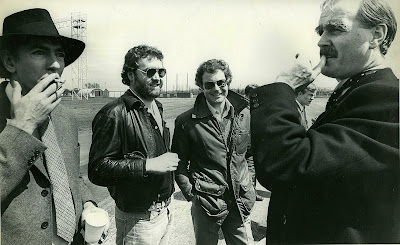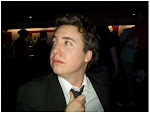
Born in Scotland, he grew up in Wales and Southsea before moving back to Scotland. “It played havoc with my accent. I ended up with an English accent, and my parents were very broad Scots.” Fortunately this gave him an ear for accents “I got very good at pulling out an accent when I had to”. This, and seeing Richard Burton on stage, was what gave him “the bug for acting”.
In his teenage years, Bernard went on an exchange trip to France, discovering French wine, French women, and an appetite for adventure. Formal educationwas not his thing, and a 15 year old Bernard would travel to Glasgow every day instead of school on a forged train ticket and go to museums, art galleries, cinemas and libraries, educating himself.
Of course, nowadays the work that Bernard is most known for is with film and television comedy. He got his start on through a stint of deception, saying that he had worked on many previous films and television shows, and with a ballsy move when being asked to edit a script, he instead wrote completely new scenes, and was soon following hot on the heels of writers like John Cleese, Graham Chapman, and Peter Cook, writing and finding sketches for Ronnie Barker, further getting to know the future members of the Monty Python troupe whilst working on the series Doctor in the House.

“Graham had stopped drinking, but he had started to use coke quite heavily”. The conversation turns dark as Bernard looks down. “I’d been in LA, got an apartment there, and Isuddenly realized one day that I had been there for 2 or 3 weeks and had coke every day”.
On cocaine - "LA in those days, you would get in cabs and people would say 'Hey man, you want a toot?' "
“This is not good, I thought, so I decided to stop...which is hard to do in LA in those days, because everybody offered it to you. You would get in cabs and people would be saying “You want a toot, man?”
The writing took a long time, with Graham and Bernard falling out, and with the first draft finished, Bernard washed his hands of the writing duties, despite calls from producers asking him to save the project for an “extraordinary amount of money”.
“Eric Idle, John Cleese, James Mason, Cheech and Chong, Martin Feldman, who died during the making of the film...The film had an extraordinary cast, and was extraordinarily bad.”
Despite this description, Bernard seems to speak of his friends and colleagues fondly. He expresses a disdain for Ronnie Barker’s predilection for “bum and tit” jokes, but says he “deeply admires him as a performer”. He may speak of Graham Chapman jetting off to Australia, leaving him alone in LA, but he also talks of their love of writing, and being “chuffed” when Chapman mentioned that the only part of a Ronnie Barker movie he found funny was “a part that I wrote”.
It is clear that Bernard is from a different of show business, and perhaps takes today’s efforts from executives with a pinch of salt;
Bernard started teaching at the University of Winchester through his wife, and currently sees his job as a way of “putting something back”.
“Not every student I lecture in scriptwriting is going to be a scriptwriter, but i try to teach them to understand scripts, because if they want to produce, direct, location manage, or even be a cateringmanager, they need to understand where it comes from, how a script functions.”
“There are a few (students) who show promise” He says, smiling at me, “can’t remember if you were one of them.”
Bernard is a proud but humble man. He may tell his stories, often, and with gusto, but he still remains, at heart, the same lad he was in his early life; fascinated with culture, a powerful imagination, and a sense that bigger things are always waiting over the horizon.















 Obviously this is only one of many Thompson articles, and I should not jump to conclusions, but there is something about Gonzo Journalism that strikes a chord. Maybe it is the mix of journalism and literature, perhaps it is the appealing thrill of reckless abandon for the sake of journalistic prose. It could be many things, but it all seems pretty awesome.
Obviously this is only one of many Thompson articles, and I should not jump to conclusions, but there is something about Gonzo Journalism that strikes a chord. Maybe it is the mix of journalism and literature, perhaps it is the appealing thrill of reckless abandon for the sake of journalistic prose. It could be many things, but it all seems pretty awesome.  (The images seen in this blog are all by Ralph Steadman, a British Cartoonist and Caricaturist who worked with Hunter S. Thompson many times)
(The images seen in this blog are all by Ralph Steadman, a British Cartoonist and Caricaturist who worked with Hunter S. Thompson many times)






